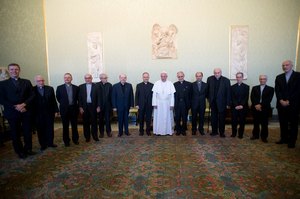The are several great things we have to attend to with the Pope's address today in Rome. Two quick ones: "losing the attitude of wonder, contemplation, listening to creation; thus we are no longer able to read what Benedict XVI calls "the rhythm of the love story of God and man." WOW! Bingo!
We live in an era where disposability and waste is routine: shoes, cars, pencils, clothes, human life, etc. Don't like it, not the "right color", it is not right for me: all these sentiments are clear indications that you and I are careful on how and why we use our material and human resources. The Pope in his weekly Wednesday audience today drew our attention to the reality of waste. During the pontificate of John Paul II we Catholics were introduced to the concept of solidarity. But we were also introduced dramatically to the concept of encounter with the Lord, and with one another. The examination of conscience we will do today ought elicit some painful realizations that I hope will encourage meaningful and concrete change in how we relate to God, the other person, and to creation. Call what Francis did many things: naming the culture of death, pointing to a mentality of waste, singling a need to change our behavior so that the poor may eat. Francis' teaching is not new --it re-proposes the beauty of our Catholic teaching. Pope Francis exposes a deep wound in our relationships that needs healing.
What is our response? What response can we find with the help of the Benedictines, the Dominicans, the Franciscans? What can the laity do with the clergy to be more attentive to these rhythms of God's love story???
Pope Francis....

Today I want to focus on the issue of the environment, which I have already spoken of on several occasions. Today we also mark World Environment Day, sponsored by the United Nations, which sends a strong reminder of the need to eliminate the waste and disposal of food.
When we talk about the environment, about creation, my thoughts turn to the first pages of the Bible, the Book of Genesis, which states that God placed man and woman on earth to cultivate and care for it (cf. 2:15). And the question comes to my mind: What does cultivating and caring for the earth mean? Are we truly cultivating and caring for creation? Or are we exploiting and neglecting it? The verb "to cultivate" reminds me of the care that the farmer has for his land so that it bear fruit, and it is shared: how much attention, passion and dedication! Cultivating and caring for creation is God's indication given to each one of us not only at the beginning of history; it is part of His project; it means nurturing the world with responsibility and transforming it into a garden, a habitable place for everyone. Benedict XVI recalled several times that this task entrusted to us by God the Creator requires us to grasp the rhythm and logic of creation. But we are often driven by pride of domination, of possessions, manipulation, of exploitation; we do not "care" for it, we do not respect it, we do not consider it as a free gift that we must care for. We are losing the attitude of wonder, contemplation, listening to creation; thus we are no longer able to read what Benedict XVI calls "the rhythm of the love story of God and man." Why does this happen? Why do we think and live in a horizontal manner, we have moved away from God, we no longer read His signs.





